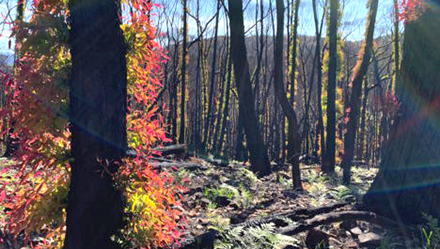Timber harvesting is not a concern of Gippsland Indigenous groups, who overwhelmingly want to be involved in direct management of forests before, during and after bushfires, the RFA Major Event Review of the 2019/20 bushfires found. Source: Philip Hopkins, LaTrobe Valley Express
The joint Commonwealth-State review, held to assess the impact of the fires on the modernised Regional Forest Agreements, took more than a year to complete and involved feedback from multiple groups, including Traditional Owners.
It was prepared by an expert panel – the Victorian Commissioner for Environmental Sustainability, Dr Gillian Sparkes AM; an independent forestry consultant Dr Tony Bartlett AFSM; and a Victorian Traditional Owner, Katherine Mullett.
The report with 37 recommendations, was delivered 18 months ago to the state government, which has not issued a formal reply. However, it has published a new draft bushfire policy.
The panel had a seat for Traditional Owner representation. It acknowledged it could not represent all Traditional Owners and their interests, or complete a dedicated consultation process that ensured that all people, groups corporations that represented Traditional owners were engaged directly.
Over two months, the panel spoke to 29 groups and individuals. Some groups chose not to take part.
“The Black Summer fires had major impacts on Aboriginal people, community, Country and cultural heritage. Many of these impacts are still felt today, years on,” the panel said.
“The destruction of Country has taken a significant toll on Aboriginal communities, causing immense grief due to the extent of the damage to forest areas, the loss of and damage to tangible and intangible cultural heritage, and the large number of deaths of wildlife totem animals, on addition to the destruction of/or damage to 42 homes of Aboriginal people.”
Traditional owners had nine areas of concern: the engagement process, Aboriginal cultural heritage management, economic impacts, access to Country, healing of Country and culture, implementation of Traditional Owner clauses, cultural burning, the condition of Country, and timber harvesting.
The panel’s report said a small number of Traditional Owners raised concerns on timber harvesting in direct relation to the major event.
“Two groups highlighted that they were not ‘against’ timber harvesting; rather they would like to see greater opportunity for Traditional Owner involvement and employment,” the report said.
“One group spoke strongly about Traditional Owners needing to be actively involved in timber harvesting planning to ensure that cultural heritage is not impacted.”
“Country needs to be seen as a cultural landscape, and unregistered heritage should be as highly considered in planning as registered sites. A better understanding of the forest resource for a range of benefits, such as economic opportunities and cultural management, can be achieved with more Traditional Owner-led processes and policies,” the panel said.
Departmental officers told the panel that the project component of the 2005 National Indigenous Forestry Strategy had not operated for some years.
“This strategy aimed to enhance the involvement of Aboriginal people in forest and wood processing industries and thereby lead to improved social and economic outcomes,” the report said.
“The panel considers that the intent of this strategy and its project component are highly relevant to the new provisions in the modernised RFAs covering Indigenous heritage, Traditional Owner rights and partnerships.”
Many groups noted the importance of Traditional Owner fire knowledge and cultural burning.
Suggestions included a holistic management of fire, including year-round management of Country, and that the 2019/20 bushfires may not have been as severe if traditional burning regimes were active.
“Traditional Owners consistently advised of their desire to be more actively involved in direct management of forests before, during and after bushfires,” the review said.
“Traditional Owners seek to be managing fire directly, with their own crews and equipment. They see themselves as fire givers, not firefighters.”
The RFA Major Event Review made several recommendations regarding Traditional Owners:
- Review the forest and fire management systems to improve the role of Traditional owners, who should be actively involved in site management during and after fire-suppression operations;
- Assess all cultural sites affected by the fires and put in place protection measures;
- The federal government should revitalise the 2005 National Indigenous Fire Strategy to enable Traditional Owners to use the RFAs to create forestry jobs through partnerships with forest businesses, and;
- The state government at a regional level should partner with Traditional Owners and Parks Victoria to develop RFA plans for each Traditional Owner group.






